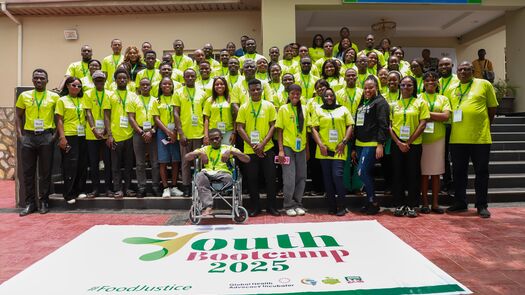November 25, 2025

Juan Carballo, JD, LL.M, providing testimony at the Thematic Hearing on the Right to Food of Children and Adolescents in Latin America and the Caribbean
A historic milestone was achieved on December 13, 2021, when the Thematic Hearing on the Right to Food of Children and Adolescents in Latin America and the Caribbean was held before the Inter-American Commission on Human Rights (IACHR). It was the first time the IACHR discussed the right to food in a thematic hearing.
The Global Health Advocacy Incubator (GHAI) provided testimony alongside other civil society organizations (CSOs), mostly from Latin America and the Caribbean, coordinated by the organization FIAN Colombia. The CSOs highlighted the obligations and responsibilities of governments to promote healthy food environments and fairer food systems. They argued that governments have the responsibility to care for the land and environment, respect culinary cultural diversity, produce nutritious food, rely on conflict-of-interest-free evidence to advance health policies, prevent industry interference in policymaking and create an environment that protects children and their families’ health.
Following civil society statements, Soledad García Muñoz, the Special Rapporteur on Economic, Social, Cultural and Environmental Rights (SRESCER), pledged “to not only contribute to developing recommendations to the states but even go towards the production of a regional report on this matter”
The role of civil society in international policymaking
CSOs play an important role in advocacy to promote and defend human rights, including by advocating before international human rights bodies. CSOs can attend closed and open meetings; access draft resolutions and comment on them; participate in drafting reports and documents; provide input and evidence through written documents or presentations before and during deliberations; present shadow reports before human rights treaty bodies in collaboration with other CSOs; and communicate efforts and results.
Developments at the international arena can have an impact on local advocacy campaigns as well as the other way around. International organizations create guidelines, standards and recommendations that are applied at the country level. Advocates may also use hearings to encourage human rights bodies to undertake site visits or develop a thematic report.
IACHR hearings
Thematic hearings provide a way to generate public awareness of a human rights concern and educate commissioners and international organization staff on a particular matter. They are one of the two types of hearings the IACHR holds – the other is case-based (or petition) hearings. These hearings contribute to the body’s findings, reports, visits and the overall planning and execution of their mandate to protect human rights in the Americas. They also focus the Commission particular human rights issues and offer an opportunity to build coalitions and amplify momentum on CSO efforts, complementing other advocacy activities. Finally, thematic hearings bring together different stakeholders to provide multiple perspectives on international and regional human rights norms.
To watch the Thematic Hearing on the Right to Food of Children and Adolescents in Latin America and the Caribbean held on December 13, 2021, click here.
To request a thematic hearing with IACHR:
- Any CSO can request a hearing. CSOs must indicate the purpose of their appearance, a summary of the information they will furnish, the approximate time required for that purpose, and the identity of the participants.
- The dates the IACHR accepts requests for hearings can be found in the IACHR Calendar.
- Organizations can consult the user manual for a step-by-step guide to requesting a hearing.



